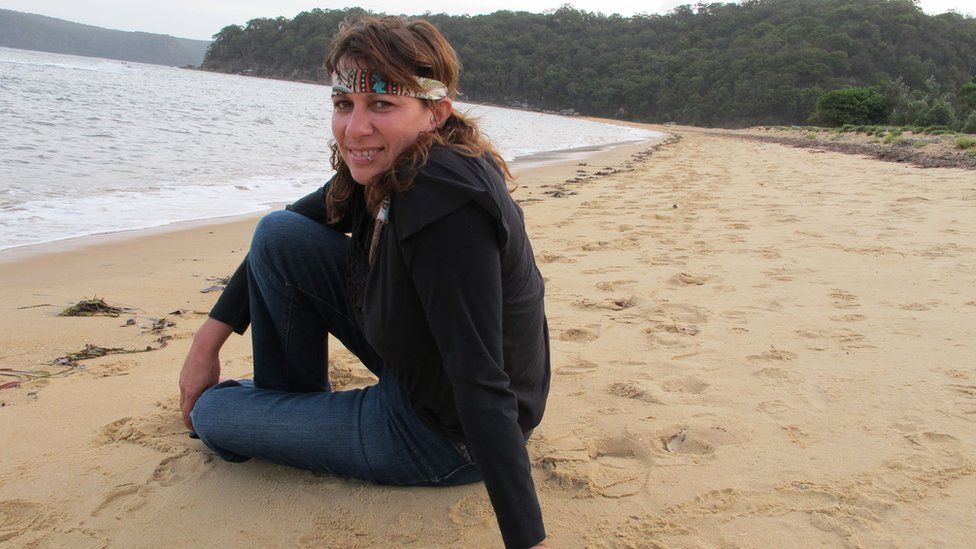Caravan to Yale: The stolen child who became a star poet
- Published

Cosy nights with family around flickering desert campfires, a burning love for kith and kin, and a long, anguished search for a lost mother are the creative forces that have forged Australia's newest literary star.
"There is no life but family," wrote Aboriginal poet Ali Cobby Eckermann in her debut collection, Little Bit Long Time, published in 2009. "When I am drunk I reverse-charge my family. When I pass away I unite my family."
Living in a caravan in a friend's back garden in Adelaide, Ms Cobby Eckermann has received one of the world's richest literary awards.
Forcibly taken from her mother when she was a young child, she has won a $162,000 (£132,000; A$215,000) Windham-Campbell prize from Yale University in the United States. It has commended her for confronting "the violent history of Australia's Stolen Generations" and her "use of nature to render the beauty of Aboriginal family bonds, as well as the pain and violence of their breaking".
The Windham-Campbell prizes are unusual because writers, who are nominated confidentially, invariably have little clue they are being considered for one.
"It seemed unbelievable," Ms Cobby Eckermann said of her unexpected achievement. "There have been so many tears of disbelief and tears of gratitude that my work is recognised. Now I just want to write and write and write! I've got a few more things to say."
Born in 1963, in Kate Cocks Memorial Babies' Home at Brighton in South Australia, she was taken as an infant from mother, Audrey Cobby, a Yankunytjatjara woman, and adopted into a German Lutheran family. She had a mostly happy childhood on a farm, but it would be years before she would be reunited with her birth mother.
"Part of the skill [of writing] comes from nearly 20 years of looking for my mum. You talk to anyone from any walk of life and I've always been a bit of a chatterbox and I like meeting people. It has definitely been an asset to writing," she explained to the BBC.
Family ties and kinship lie at her inspirational core.
"My whole family has helped me understand who I am when we reconnected," she said. "They have sat beside me in the desert and the backyard around campfires listening to my poetry and giving me feedback."
"I would hear stories and I might sit there quietly and write a poem. Then we'd read it back in the evening and we'd all celebrate that [indigenous] oral tradition was not losing its power by being transferred to the page," she said.
Her 2013 memoir Too Afraid to Cry has been described as "a narrative of good and evil, terror and happiness, despair and courage". It retraces the author's steps as a child spirited away from her indigenous mother, and a fraught journey into adulthood.
The book, along with a later collection of poems Inside My Mother, condemned Australia's policy of removing Aboriginal children from their parents to place them in orphanages, institutions or white foster families that stretched from the late 19th Century to the end of 1960s. While it has been argued there were genuine welfare reasons for taking the vulnerable to a place of safety, indigenous Australians believe it was child abduction on a mass scale.
"Her work… powerfully articulates Australian indigenous peoples' experience of colonisation and the trauma suffered by the Stolen Generations. Her work is deeply personal but also speaks to a collective experience," said Rachel Bin Salleh, from Magabala Books, which published Ms Cobby Eckermann's 2012 award-winning verse novel, Ruby Moonlight.
"She is one of the most significant writers in Australia and Magabala Books is very honoured to have been part of her journey," she told the BBC. "Ali has inspired and mentored many emerging indigenous writers and poets in Australia. Not only does it prove that, with time, true talent will be recognised, but also there is a place for Australian indigenous stories on the world stage."
The Windham-Campbell prizes will be awarded at Yale in September. As her achievement sinks in, Australia's newest literary star is already deciding what to do with her windfall.
"I'd like to use it to help purchase a property by the beach for my son and daughter and grandchildren to share, and for the desert mob to come down and have somewhere safe to stay. So much fun in just the thought of that," she said.
"The money also allows me to challenge my own journey as a writer. I want to attempt a novel. I've been sitting on a story for a while which I think is very important."
Despite the accolade and the international attention that comes with it, Ms Cobby Eckermann has insisted she'll remain humble.
"My influence will always be grassroots people and cultured people who still find the happiness in everyday - don't need money, we just need to know who we are and the strength of family," she said.
"That is the stuff that will always live in my heart."
- Published3 March 2016